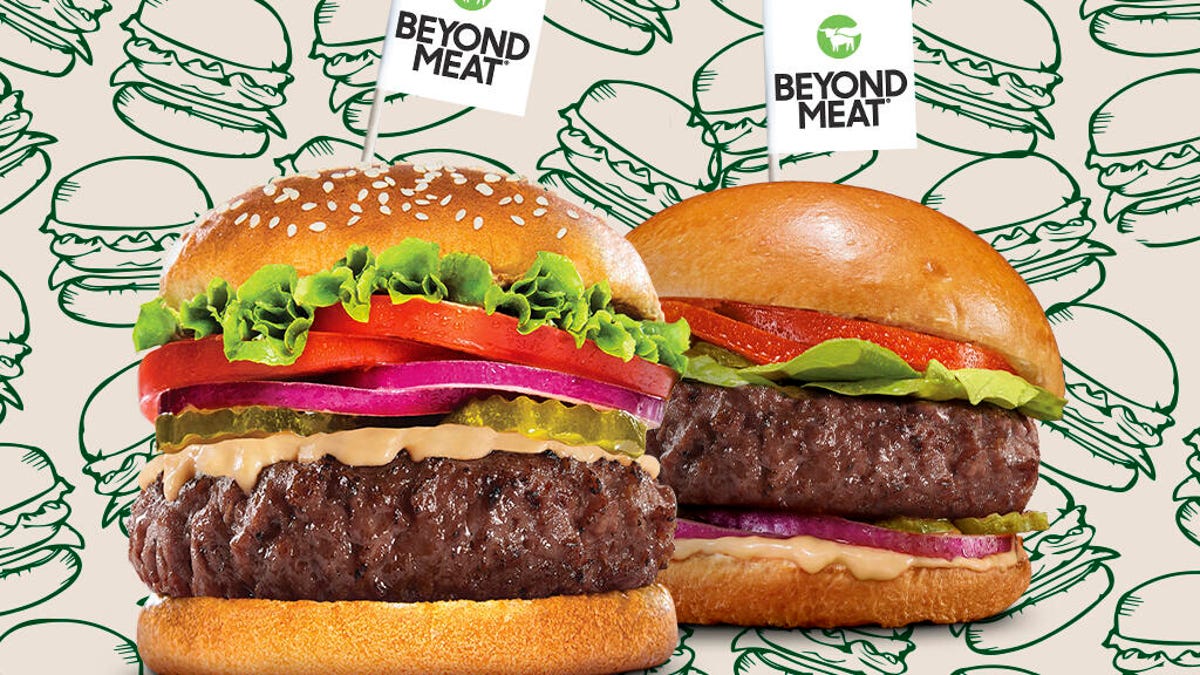When will Fast Food Inc. make up its mind about plant-based meat?
Commentary: McDonald's and Jack in the Box are the latest fast-food chains to test the plant-based burgers, which are already popular in American kitchens.

Meatless meat companies, like Beyond, have partnered with fast-food chains.
Taste, nutrition and cost are key to the growth of plant-based meat -- but acceptability is just as important. The X factor in many consumer decisions is: "What's everyone else doing?" Two recent burger announcements involving Impossible Foods and Beyond Meat show that fast food is waiting for that moment and also driving it.
Jack in the Box is now testing the Impossible Burger, allowing customers to swap that meatless beef patty into any burger the chain offers at a cost of up to $1.50 more. But that option's only available at participating locations in Phoenix through mid-December.
Most fast-food brands offer plant-based meat via a specific menu item, like Burger King's Impossible Whopper. Allowing it as a universal option for any burger on Jack in the Box's menu is an incremental step toward normalization, similar to letting a customer opt for ketchup instead of secret sauce, though with a discrete cost.
Jack in the Box is testing the Impossible patty, offering it as an option for every burger on its menu.
Jack in the Box currently ranks as the 20th largest chain by the restaurant-industry QSR Magazine, though the company may see an upward trajectory as it projects growing to 6,000 locations spread evenly across the country -- up from roughly 2,200 venues concentrated in the West. The Impossible option plays into a recent strategy by the fast-food chain to embrace higher check total "premium" customers while also serving value-centric frequent diners.
I'd be there everyday if it would just offer Impossible Monster Tacos. Better that it doesn't.
The other important announcement is a trial of Beyond Meat at McDonald's. While that's a big move since the No. 1 chain is viewed as the eventual arbiter of plant-based meat's full acceptance, the trial involves just a single menu item at eight locations.
The trial McPlant sandwich, with a codeveloped Beyond patty, is the latest in a long line of nonmeat burger tests at McDonald's locations around the world, a couple of which I've tried in the UK and Germany and found revolting. The Beyond-based McPlant will cure that problem.
I'm not sure what to think about segregating Beyond to the clumsily named McPlant sandwich, burying its brand equity much the way the auto industry tends to do with Apple CarPlay and Android Auto. On one hand, it suggests confidence in plant-based product positioning. On the other hand, launching new fast-food items is as fraught as writing hit songs. People wonder why it's taking McDonald's so long to make a system-wide decision, especially since Beyond is a proven product. The two companies already demoed a Beyond Meat burger under a different alias in Canada during a trial that ended mysteriously.
McDonald's limited US trial of McPlant with a Beyond Meat patty is far from the chain's first swing at this. Third (or sixth) time's a charm?
I keenly watch plant-based meat's relationship with fast food because these chains sell culture, not just food. McDonald's is the 18th largest advertiser in the world, and Jack in the Box has had a massive brand-reinvention over the last 12 years that made it a tastemaker with younger consumers. This sector holds significant sway over what's normal and accepted in the American diet.
Grocery store placement says: "Here's what's available, choose what you like." But the tightly constrained fast-food menu board says: "Here are the hits we play." It says a lot to make that cut.
Also important is fast food's ongoing physical redesigning to make its offerings more pervasive. Restaurants are being recast for mobile ordering; ghost kitchens make fast food to power delivery; and chains are shrinking dining rooms or moving kitchens to the second floor. It's about access to food the way we want it in an era of recently reset consumer expectations. The trend is as historic to this sector as the electrification of the auto industry or remote delivery of health care.
And just as Walmart infamously flogs its suppliers to reduce costs, Fast Food Inc. will instill a cost-reduction discipline in plant-based meat stronger than might happen under any other yoke.
It may seem impressive when high-end restaurants or big-name chefs go plant-based, but that's not where America takes its dining cues from. Fast food has an almost unique ability to make plant-based meats affordable, accessible and acceptable.

